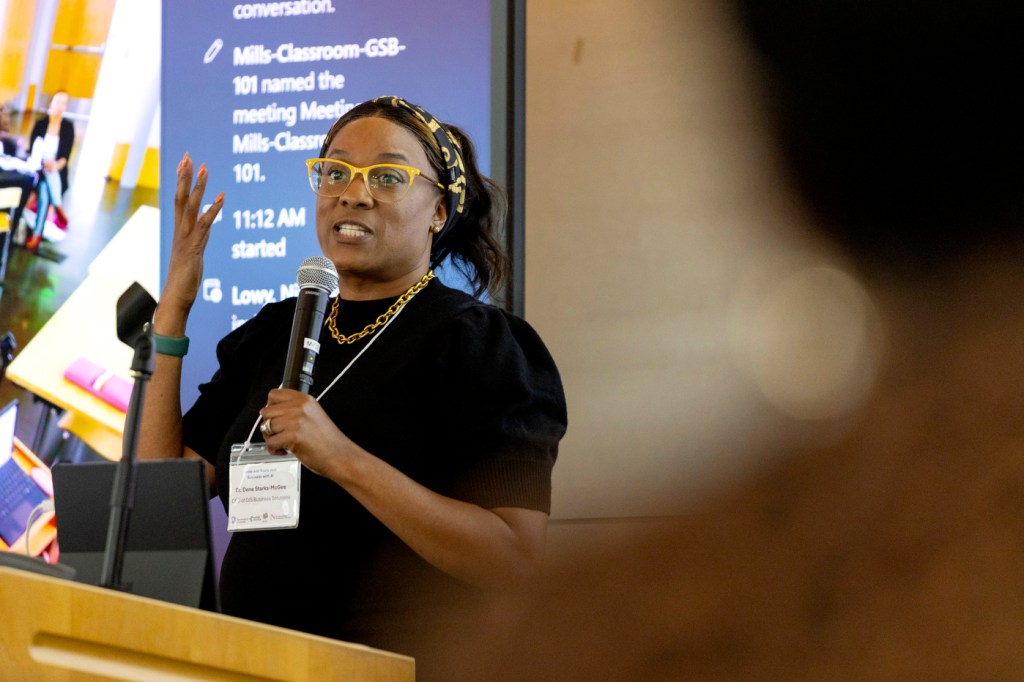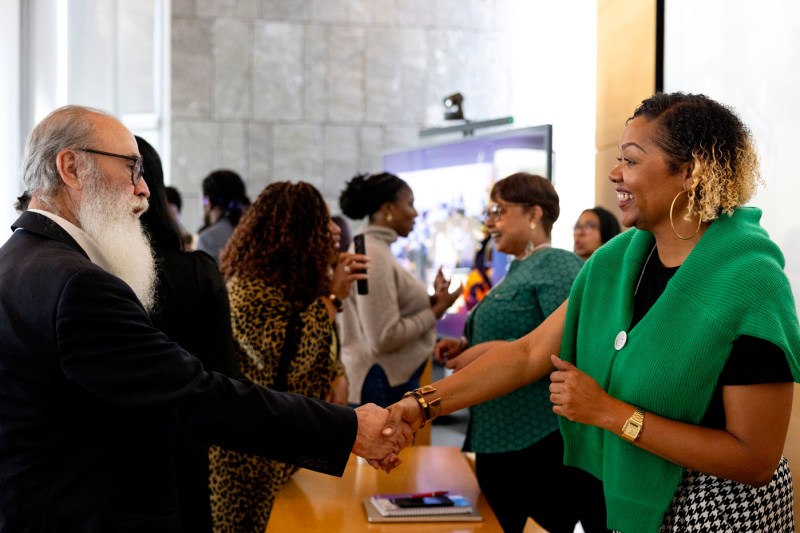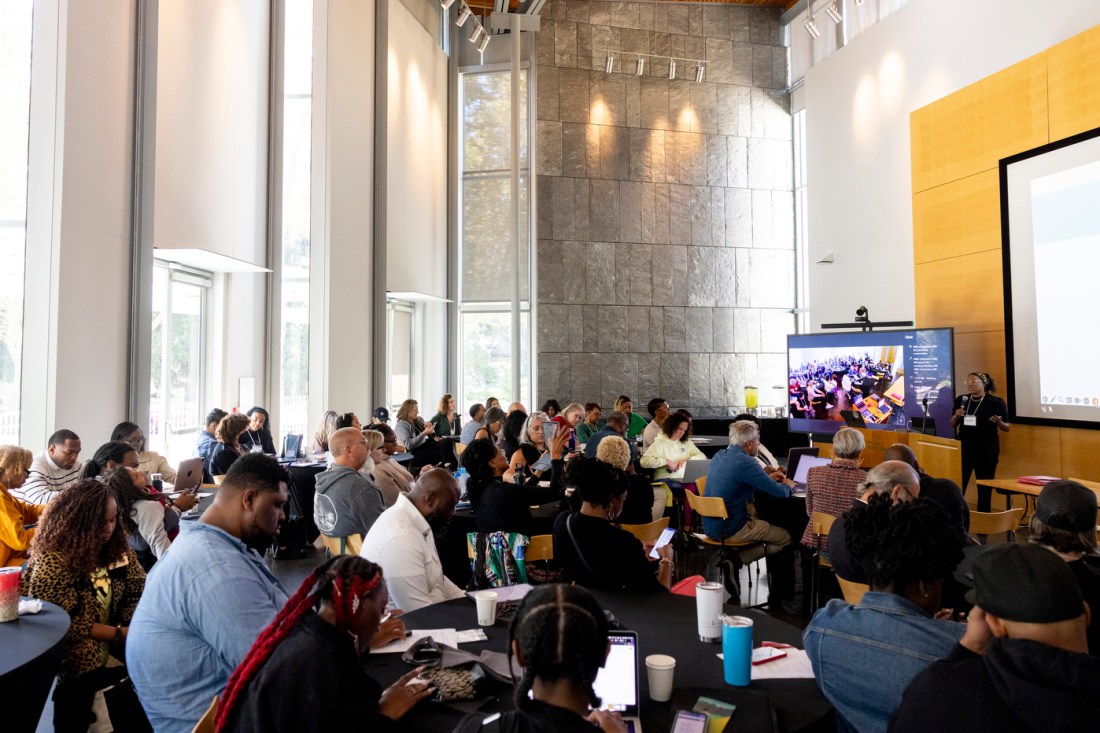Small business owners empowered with useful AI tips during workshop at Northeastern’s Oakland campus
Dozens of Bay Area small business owners and entrepreneurs gathered at Northeastern for a day of learning, and weighing the benefits and challenges of using artificial intelligence.

OAKLAND, Calif. — The key to using artificial intelligence is to keep your eyes open, said Chandra Brooks, founder of The Powerhouse Woman and a panelist at a free artificial intelligence workshop on Northeastern University’s Oakland campus.
Despite the time and money-saving advantages of using AI, experts emphasized the importance of maintaining an authentic brand voice in the face of automatically generated copy and images.
“I started to see how it worked for me, not just copying and pasting,” said Brooks, whose business consulting company is based in Oakland. “Making sure to change the words to fit your voice.”
Brooks is the author of “Black, Brown and Political,” a resource for people of color to navigate community government. Brooks said she used AI tools to help outline her book, but the ideas and word choices were distinctly her own.




“You want it to do the grunt work, not the heavy thinking,” agreed fellow panelist Ari Takata-Vasquez, founder of Viscera, an Oakland-based design house. “You have to be in control of telling it what to do.”
Dozens of Bay Area small business owners and entrepreneurs gathered at the Lokey Business School for a day of learning, and weighing the benefits and challenges of using AI, a expedient tool in today’s business landscape.
Northeastern partnered with Block and The Kapor Center to provide Saturday’s workshop, which included a keynote lecture by Mashama Thompson.
The workshop was a follow-up to a virtual two-hour session on Thursday, hosted by The Roux Institute, that focused on crafting effective AI prompts that lead to enhanced efficiency and technological adaptability.
The attendees were eager to learn all things AI — if a bit nervous about how to use it responsibly.
But whatever you think about AI, it’s here and gaining momentum.
“The worst thing we can do is run away from current trends,” said Trevor Parham, a panelist for the morning session. Parham, founder and CEO of Oakstop, uses AI to make videos and social media posts to advertise his Black-owned real estate business. “It’s not as complex as one might think.”
AI writing tools like Grammarly, Scribe and Copy.ai can write anything from books, emails and texts based on prompts, but panelists advised using them cautiously. The specificity of the prompts — and rephrasing AI-generated copy to fit your voice — is key, experts said, to ensure the end product is ethically attributed as your own work.
Embracing change
“My son sent me a link for this,” said Paul Raskin, a partner at Redwood Fiduciary Services in Oakland. Raskin, like other small business owners in attendance, didn’t want to be left behind in learning to leverage tools like ChatGPT to more quickly build websites, make presentations and create marketing materials that have traditionally taken days, weeks and sometimes even months.
With AI, it takes minutes.
“You don’t have to start from scratch and pay someone $3,500 to build your website,” said speaker Dené Starks McGee, CEO of DJS Business Solutions, who led a presentation on AI case studies.
Starks McGee pulled up websites for attendees and gave practical tips on which tool could be used for typical business scenarios. One example was Joust, which creates original artwork based on prompts specifying style and subject matter — useful for creative businesses looking for images without having to hire a graphic artist.
“This helps you offload some things,” she said.
Other AI tools are even more otherworldly, creating convincing, completely virtual people to front your business.
Featured Posts
Synthesia can generate a human face and voice to give business owners a spokesperson for presentations and marketing when they don’t want to be the face of the business themselves, Starks McGee said.
“If you want to create a dinosaur that talks like a baby, you can do that,” she said to laughter from the audience.
That appealed to Shiree Dyson, founder of Sage & Needles, a Berkeley nonprofit that teaches free workshops on making and repairing clothing. Dyson wants to create online tutorials for her business but doesn’t want to be featured in the videos herself.
“I’m definitely not the person who wants to be out front,” she said. “I’m a background person.”
Also important, the panelists said, is to review what AI makes for you.
“Type in what you’re thinking,” Starks McGee said. “We’re not here to copy and paste.”
“If you use AI to write your business plan, read it. Make sure it’s giving you what you actually do,” Starks McGee said.
The same advice goes for built-in AI on platforms like LinkedIn, which can generate your work biographies but can sometimes get facts wrong, like where you went to school.
Parham said his AI biography claimed that he attended University of California at Berkeley.
“Not true,” said Parham, who went to the University of Pennsylvania.
Added revenue
AI business applications seem endless, but Mike McAllen had an immediate thought for his Oakland podcasting company, Podcasting4Associations: feeding existing materials into something like Scribe to create pay-to-learn tutorials for clients and staff.
“I have a lot of hesitation to do courses,” he said. “This has made me think I can have AI help me.”
McAllen is already familiar with AI video tools like Opus.pro, which repurposes long videos into shorts, hashtagged and formatted for social media sites like Instagram. Being able to feed his podcasting knowledge into AI programs to build quick tutorials can be an additional income stream for clients who want to learn how to podcast, or for onboarding employees at the company to ramp up their knowledge.
“I have this stuff written up already,” McAllen said.
McAllen wasn’t the only attendee thinking about tutorials for added revenue.
“Everybody here specializes in something that you can make into an e-course and sell it,” said Starks McGee.
Another attendee, Wen Minkoff, director of marketing for San Francisco-based Concha Labs, saw an opportunity to use Gamma to make presentations advertising a new over-the-counter hearing aid, which received FDA-approval in June.
“Being able to use that content in a smart way is important because we’re small,” she said.
By lunchtime, attendees gathered to network and compare notes on what they’d learned. Sharing tips in the Lokey building lobby and on the sunny lawns outside, they said AI seemed a little less daunting, thanks to the speakers who donated their time and the university that hosted the event at no charge.
“I love that this series is both taught by Northeastern leaders and faculty and also community-based entrepreneurs and leaders,” said Carrie Maultsby-Lute, head of partnerships on the Oakland campus, who was assisted by Nikki Lowy, director of community and city outreach and programming, in planning and running the workshop.











